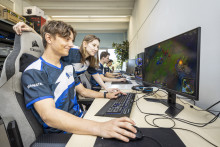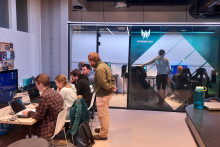The Chair of Esports Team Twente, their Research Manager and a top gamer come together to talk about their association. The team has several rooms that are located on the third floor of the Bastille. There’s one large room, but also smaller spaces that lead directly into other rooms and behind the last door, the trio sits around a table bearing several computer screens.
Top-level sports status
Developing esports as professionally as possible, in conjunction with the university: according to Ivo Jeeninga (21), Chair of the team, this is the association’s most important goal. The fact that esports has now gained top-level sports status at the UT has therefore been a major triumph. ‘That's great news for us and something we should celebrate. A top-level sports status means a top player can access many more opportunities to become better.’
Esports is a young sport. So that means there are plenty of opportunities for growth. And growth, according to the team, can only be achieved through good research. Jeeninga: ‘In football, there are thousands of strategies and tactics out there. But relatively little research has been done on gaming. We want to change that. We are the only student team in the Netherlands that conducts research and relates it to a UT minor.’ He is referring to the Esports minor taught by Assistant Professor Guido Bruinsma.
Data analysis
Jennifer Schulze (24) is particularly interested in the development of esports. She is the Research Manager for the association and she focuses on areas that can be improved for gamers. ‘We want to know how both individual gamers and teams can improve. We look at the things that can be analysed within the games themselves, but also in the behaviour of the gamer. Does the person communicate clearly? Where and how do they train? What is the best thing to eat before gaming? Does a physical warm-up make a difference? We are trying to carry out data analysis to look at this.’
Someone who has benefited from this within Esports Team Twente is Finn Tempelaar (21). Although he is rather more modest about his role, Chair Jeeninga describes him as the club's standard bearer. Tempelaar is a member of the League of Legends team. This is a very popular game on the international stage, which sees groups of usually five players compete against each other, trying to beat their opponent. Tempelaar: ‘In the Netherlands, we almost always come out on top, and we are also doing well on a European level. For me as a player, research into esports has added an extra dimension to gaming. I would like to delve further into that, so I share as much of my life as possible: my routine, how I eat, exercise and game. It is a common misapprehension that to become good at gaming, you have to spend hours doing it every day and night. We’d like to demonstrate how you can become good at gaming, but also integrate it into your life in the right way.’
FC Twente
The team from Twente excels in League of Legends, but also plays numerous other games. Tempelaar: ‘Counter-Strike, for example, where we have a partnership with the Marine Corps. With this, we demonstrate how we can communicate with each other as efficiently as possible. We gave a demo on that at the Invictus Games last year.’ Jeeninga goes on to give an even more famous example. 'We also play the football game FIFA, and our team is FC Twente, of course.’
Feeding your brain is more important in esports than feeding your muscles. Top-level gaming primarily takes place on a mental level and less so on a physical level.
Esports Team Twente, or ETT for short, has only existed for two years, making it the youngest student team at the UT. Generally speaking, the team has similar activities to Blueshell Esports, but Jeeninga says there is a subtle difference: ‘At Blueshell, the focus is on gaming in general, but we prefer the focus to be on gaming in competitions. The dividing lines are sometimes a bit blurred, but we want to take gaming a step further. All of our players take part in gaming tournaments. For people who like gaming but are less driven to do it professionally, Blueshell is the right club.’
Gamers are subject to a lot of stereotypes: unhealthy people, slumped in their desk chairs, consuming nothing but pizza, chocolate bars, coffee and energy drinks. These are prejudices that, at first glance, don’t match up with the reality of the esports team. The three team members sit sipping large cups of tea during the interview and on the refrigerator, there is a bottle of beetroot juice.
Schulze has also focused in on nutritional aspects when researching gaming. ‘Caffeine can improve gaming performance, but an athlete needs to think about protein, because this is a top sport. Feeding your brain is even more important in esports than feeding your muscles. Top-level gaming primarily takes place on a mental level and less so on a physical level. Hand-eye coordination is the main skill required, along with a good reaction time. That is where you make the difference.’
Jeeninga hopes that the team will be able to progress over the coming years. As he well knows, the gaming industry is now bigger than the film industry, so developments can follow on from each other in quick succession. ‘We’re very much looking forward to the arrival of the Esports Lounge. We can then finally organise more events and show everyone what we’ve been up to. That’s something we’d really like to happen because the pandemic has diluted face-to-face gaming culture a bit.’






